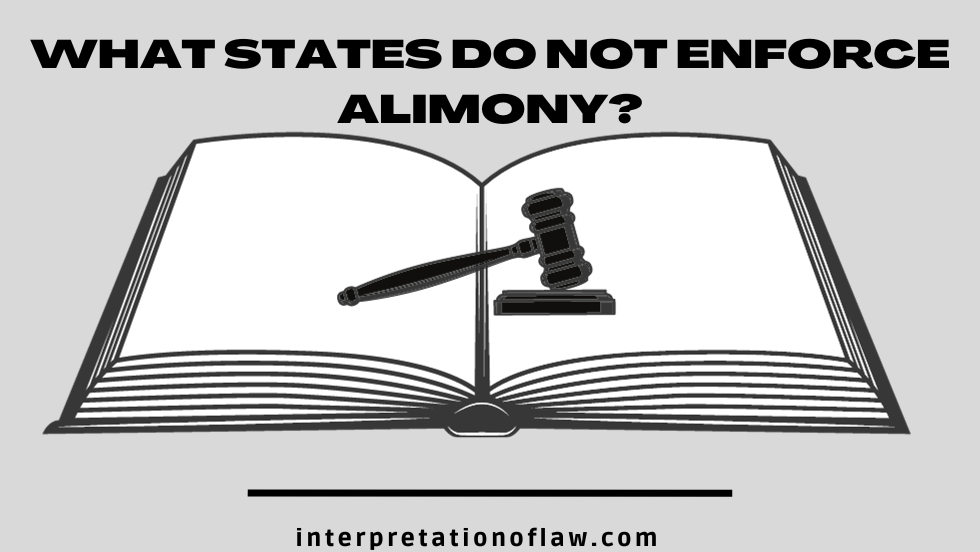This report provides an in-depth investigation into the various stances on alimony in different US states. The aim is to examine which states enforce alimony and under what circumstances and the states that do not enforce maintenance, as well as the reasoning behind their decisions.
Additionally, what states have alimony laws in place but have lenient enforcement measures, and how does this affect both parties involved?
The report is up-to-date and includes relevant sources to support the findings. The report concludes with an analysis of the overall trends and differences in alimony enforcement across the United States.
What States that Do Not Enforce Alimony
Below are no alimony states where alimony is not typically granted, and when it is, the amount is minimal or for a short duration.
Texas
Texas has some of the nation’s strictest alimony rules. The court in Texas can only grant alimony if the spouse requesting assistance can demonstrate that they cannot fulfill their basic reasonable needs or have a condition that makes it impossible for them to work.
Mississippi
Mississippi is known for not being in favor of spousal support. Mississippi law states that alimony may only be granted when one spouse has a proven necessity for financial support and the other spouse has the means to provide it. Mississippi has no predetermined method for defining the amount and length of alimony payments.
Utah
Alimony payments are also restricted in Utah. According to Utah law, the duration of alimony charges may not exceed the time of the marriage, and the court must determine that the spouse seeking assistance has made a good-faith attempt to become self-sufficient. According to Utah law, Alimony payments must not exceed what the recipient needs to survive.
North Carolina
In North Carolina, the court may grant alimony if one spouse is financially reliant on the other spouse. However, in cases where the dependent spouse had an affair while the couple was still married, North Carolina has a rebuttable presumption that alimony cannot be granted.
These states with no alimony or strict alimony laws have a common theme of prioritizing self-sufficiency and financial independence for both parties involved in the divorce. This approach aims to reduce conflict and promote fair outcomes for everyone involved.
States that Enforce Alimony
Below are the worst states for alimony enforcement:
Florida
Florida is often considered one of the worst states for alimony due to its regulations that permit lifelong maintenance. Regardless of changes in circumstances, a spouse who has been ordered to pay alimony may have to continue doing so for the rest of their lives. Florida has a high standard for altering alimony payments, making it challenging for those paying alimony to receive relief if their financial status changes.
New Jersey
New Jersey receives criticism for its alimony laws, as a spouse may be obliged to pay alimony for the rest of their lives because it can be granted indefinitely. New Jersey courts have a negative reputation for antagonizing people who seek to alter or end alimony payments, even if their financial condition drastically changes.
Massachusetts
Massachusetts is notorious for having some of the highest alimony rates in the US. Some alimony awards made by Massachusetts courts exceed the recipient’s actual expenses, making it challenging for the payer to fulfill their other financial commitments.
Pennsylvania
Pennsylvania is frequently criticized due to its unclear rules for calculating alimony payments. Consequently, results may vary significantly, with some payers being found liable for exorbitant amounts. Alimony may also be awarded indefinitely in Pennsylvania.
How can a husband avoid alimony?
The best way for a husband to avoid alimony is to have a prenuptial agreement before marriage. This legally binding document outlines how assets and property will be divided in divorce, including any potential spousal support. If a prenuptial agreement is not an option, then it’s essential to consult with an experienced attorney to determine the best course of action. This may include disputing the need for alimony based on financial resources and potential earning capacity or negotiating a lump-sum payment to avoid ongoing charges.
FAQs
In which case alimony is not granted?
If both parties have equal earning potential and financial resources, one person may not need to provide financial support to the other. Additionally, suppose one party was found to havecommitted adultery or engaged in other misconduct that led to the marriage breakdown. In that case, they may not be entitled to receive alimony.
Can a working wife get alimony?
The answer is yes, it is possible. However, seeking the guidance of a seasoned divorce and alimony attorney is crucial to ascertaining your rights and understanding the intricacies of your unique circumstances.
Is alimony mandatory in California?
No, alimony is not mandatory in California. The court will determine whether maintenance is necessary and the duration and amount of the payments based on factors such as the length of the marriage, the standard of living during the wedding, and each spouse’s financial status.
How much alimony can a wife get in the USA?
There is no fixed amount for alimony in the United States, as it varies by state and individual case. Some states have guidelines to determine an appropriate amount based on income and need, while others leave it up to the court’s discretion.
The duration of alimony payments also varies depending on state laws and individual circumstances. Generally, It is usually around 40% of the paying party’s income.
Is alimony permanent in divorce?
In most cases, alimony is not permanent and has a predetermined duration. However, some states allow for lifetime alimony in certain situations, which is becoming increasingly rare. Most states have laws that require the payer to provide financial support only until the recipient can become self-sufficient or until there is a significant change in circumstances.
Conclusion
In conclusion, alimony laws in the United States vary significantly from state to state. While some states have strict limitations on alimony or do not recognize it, others have more lenient regulations that can result in lifelong financial obligations for one spouse. It is essential for individuals going through a divorce to understand their rights and seek legal counsel to ensure fair and reasonable outcomes.
Additionally, moving out of state to avoid alimony may not be a viable option, as courts can enforce alimony orders across state lines. Communication and understanding individual circumstances are crucial in reaching fair and just resolutions regarding alimony. So, consulting an experienced family law attorney for guidance is always recommended.
#References:
https://www.forbes.com/advisor/legal/divorce/what-states-enforce-alimony/
https://en.wikipedia.org/wiki/Alimony

Carter Wilson is a licensed lawyer with over 10 years of experience in various legal fields. He is passionate about making law accessible to the general public and helping individuals navigate through complex legal matters.

